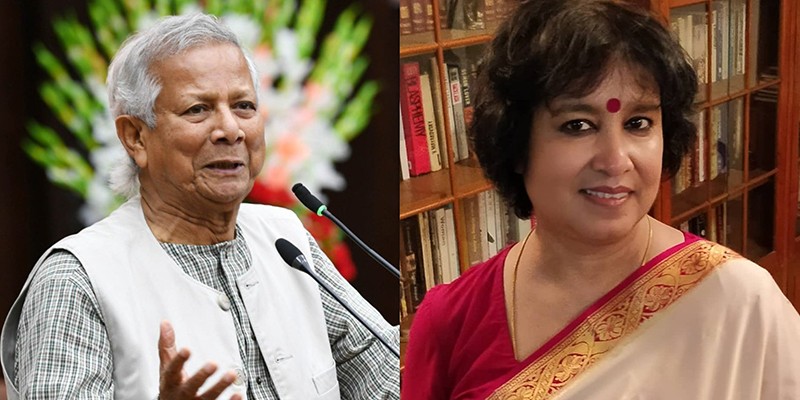
6. Dream of a Life of Equality
Taslima Nasrin, the Bangladeshi feminist writer has not returned home. She is still in self-exile since she fled the country in 1994 following with multiple fatwas on her head after her controversial book Lajja was published in Dhaka.
The book was immediately banned in Bangladesh when angered Muslim fundamentalists made a great noise. First, she lived in Sweden and France. Now in India.
The fundamentalists after issuing first the fatwa started an agitation and forced the government to issue an arrest warrant against her for hurting religious sentiments. Taslima went into hiding and the moment she got bail from a court she fled to Europe.
On May 1, 2025 she wrote to the Nobel Committee to withdraw the Nobel Peace Prize which was awarded to Muhammad Yunus, who is currently heading the interim government of the country.
In her letter Taslima wrote, "You awarded the Nobel Peace Prize to Muhammad Yunus of Bangladesh. But he has not done a single act for peace. While at Grameen Bank, he evaded taxes, used foreign donations intended for the bank to establish numerous business ventures, and when women who took microloans failed to repay with interest, Grameen Bank's enforcers would demolish their homes.
Now, he has illegally assumed power in Bangladesh by aligning with jihadi militants. Over the past nine months, under his orders, opposition members and minority Hindus have been killed, their homes burned and destroyed, and many have been falsely imprisoned. He has demolished the country’s history museum and obliterated statues of Bengali heroes. As an agent of Pakistan, he is now frenziedly preparing for war against neighboring India."
I fully agree with her.
Nobel Committee has its own agenda when it comes to the selection of individuals.
However, here I want to discuss one of her books which I just finished reading. I wish to discuss her 363-pages book titled ‘Forashi Premik’ (French Lover is the title of English translation, published by Penguin). It was first published by Bangladesh’s Ankur Publishing House, which didn’t get rave reviews.
It is somewhat an autobiographical novel. A young girl Nilanjana is cheated by her lover and then she marries a Bengali youth, a restaurant owner and flies off to France. After marriage she does not like the life of drudgery she has to submit to in her husband’s home.
The home seems to be a gilded cage for Nilanjana. In her marriage, she functions as little more than a housekeeper and sex object. She desperately looks for a way out and deserts her husband and steps into an uncertain world.
Her experiences have made her belief firm that Bangladeshi men do not believe in equality.
She dreams of a life of equality with a foreigner. Her dream to find ‘that man’ is fulfilled but the ‘dream of a life of equality’ is soon dashed.
She meets Benoir Dupont, a blond, blue-eyed handsome Frenchman, and is swept off her feet. Benoir introduces Nilanjana to the streets, cafes and art galleries of Paris. Still, something was missing.
She reaches a conclusion that ‘all men across the world are of same nature’ and there is absolutely no difference except the colour of their skins. Their first priority is not the woman they love. The world has not changed much.
Seems to be a flat story yet it is a fascinating glimpse into the workings of a woman’s mind.
Imagine it in the Taslima touch and you will be mesmerised.